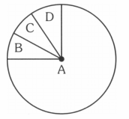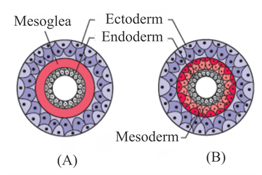Introduction to Non-chordate Phyla
Introduction to Non-chordate Phyla: Overview
This topic covers concepts such as Tissue Level of Organisation, Body Cavity, Non-Chordates, Kingdom Animalia, Protostomes Plan, Deuterostomes Plan and Classification of Animal Kingdom.
Important Questions on Introduction to Non-chordate Phyla
The tissue level of organisation is first seen in
Which group of animals have haemocoel?
What is the function of coelom ?
What are the different types of coelom ?
What is body cavity ?
Mention the characteristics of body plan of protostomes.
Given below is the representation of the extent of global diversity of invertebrates. What groups the four portions (A-D) represent repectively

The given figure shows the germs layer. The animals having structures shown in the figure are respectively known as

Anus develops first in the embryo and mouth is formed later. It is called
Which of the following is a correct sequence of decreasing order of number of species?
Match the following and select the correct option.
| Column I | Column II |
| A. Organ level | 1. Pheretima |
| B. Cellular aggregate level | 2. Fasciola |
| C. Tissue level | 3. Spongilla |
| D. Organ system level | 4. Obelia |
Match the following columns:
| Column I | Column II | ||
| A | Choanocytes | 1 | Platyhelminthes |
| B | Cnidoblasts | 2 | Ctenophora |
| C | Flame cells | 3 | Porifera |
| D | Nephridia | 4 | Coelenterata |
| E | Comb Plates | 5 | Annelida |
